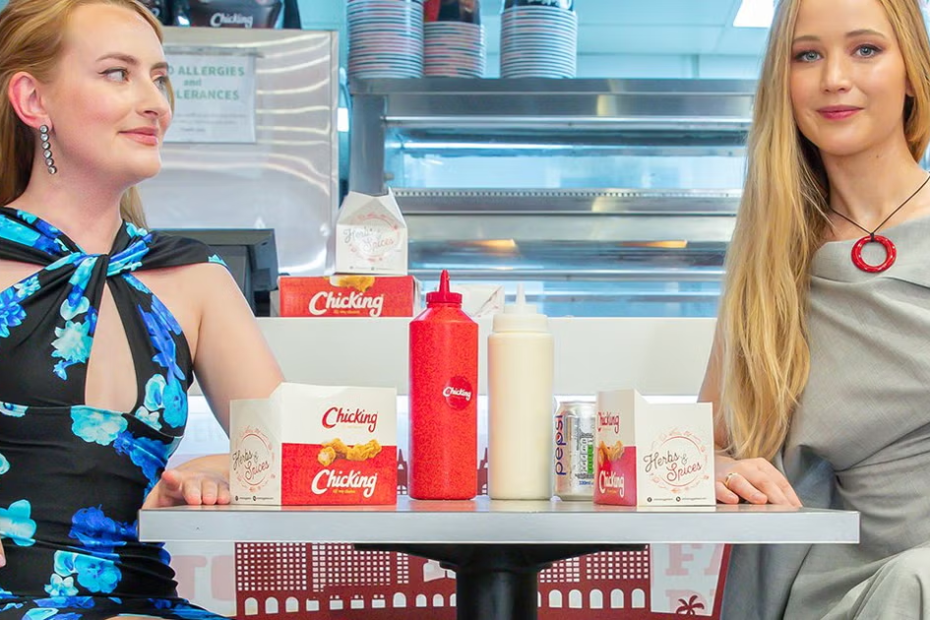By Amina Khadidja Sadoun, BA Politics and International Relations.

Amelia Dimoldenberg (left) photographed with Jennifer Lawrence (right) at a ‘Chicken Shop Date’ interview.
The MOBOs have celebrated black artists and culture for over twenty years now, and their most recent nominations for the 26th annual event have certainly been raising eyebrows. In the category of ‘Best Media Personality’, one name stands out. Amelia Dimoldenberg, best known for her awkward and blunt media persona, earned herself a nomination as the host for the hit online series ‘Chicken Shop Date,’ which first aired in 2014 and consisted of Dimoldenberg interviewing various grime, hip-hop and drill artists, who were consistently black and British. She now has several gigs working as an interviewer on the red carpet following the success of ‘Chicken Shop Date’.
Her involvement with the ‘Chicken Shop Date’ series itself was criticised as many saw it as a way to capitalise off of working-class ethnic/POC culture in the UK. Being a middle-class white woman, chicken shops are not commonly, if ever associated with Dimoldenberg’s upbringing. The fact she was using such a staple of working-class ethnic experiences was viewed as inappropriate. Others saw no problem with this as Dimoldenberg didn’t actually impersonate working class or ethnic persons, instead, they argued, she leant into her middle-class identity. This makes for an interesting dynamic where she is very obviously out of place in the chicken shop, interviewing predominantly working-class black men.
The real issue for many lies with the fact that she has now been accused of mutating the ‘Chicken Shop Date’ series, and now interviews Hollywood A-listers and popular figures globally, such as Jennifer Lawrence and Dominic Fike. The chicken shop, one of many symbols of British working-class identities, is now being used to promote individuals who don’t belong to that demographic. Therefore, they cannot empathise with the importance it holds as an area of socializing within communities and is often the only type of food working-class families can afford. The stigma surrounding these chicken shops has also not been addressed by Dimoldenberg or her A-list celebrity guests, making their use of the setting as a backdrop that much more problematic.
Knowing all of this, the MOBOs still chose to nominate her for ‘Best Media Personality’ knowing full well the backlash that could be received from the working-class black public, the very demographic the MOBOs seek to celebrate through their awards. Her recent nomination re-opened conversations on her building a career off the back of a stigmatised culture that she has had no part in pioneering. The ‘Chicken Shop Date’ can’t really be argued to be furthering black and working-class ethnic culture/peoples as it has only served to create more opportunities for Dimoldenberg to work as an interviewer and in the media. This further begs the question: would a black presenter on the ‘Chicken Shop Date’ be offered the same career opportunities? Many have pointed out that when black people want to celebrate their culture in the media, they are often defamed. Prime examples are black grime and hip-hop artists being associated with criminality for their artistic personas, whilst white artists in the same categories don’t seem to suffer these consequences. Dimoldenberg being loved for something a black host would potentially be smeared for adds to the controversy of her nomination.
““the knowledge that Dimoldenberg is not black, and has not contributed to black culture in any way, the MOBO nomination only seems more inappropriate and unfitting.”
The MOBOs pride themselves on celebrating anything associated with ‘black culture’, rather than ‘black people’ specifically. They are no strangers to nominating and even giving awards to white artists. In 2014, Sam Smith managed to bag 4 different awards, including ‘Best R&B/Soul’ and ‘Best Song.’ There is space for non-black artists to be celebrated at the MOBOs, under the conditions that they are celebrating music of black origins or making significant contributions to existing cultures. Dimoldenberg doesn’t fit either of these categories. She appears to have been able to capitalise off black and ethnic working-class culture, without giving anything back in return. With the knowledge that Dimoldenberg is not black, and has not contributed to black culture in any way, the MOBO nomination only seems more inappropriate.
